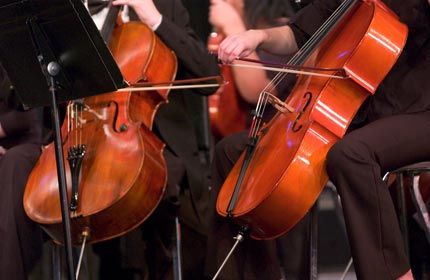False notes from Vienna
 The Christmas, New Year and Chinese Lunar New Year holidays are peak periods for classical music, and audiences look forward to hearing big-name international orchestras.
The Christmas, New Year and Chinese Lunar New Year holidays are peak periods for classical music, and audiences look forward to hearing big-name international orchestras.
For years, quite a few have been promoted as world-class orchestras from Vienna, billed as the "Vienna Symphony Orchestra."
There's quite a bit of confusion as there are quite a few ways to translate German orchestra names into Vienna Symphony Orchestra and lure Chinese audiences over the holidays.
Music critics say that many music lovers are not very sophisticated and may be taken in by European orchestras (which still may be quite good) charging high prices for classical music.
Many excellent but out-of-work musicians in Eastern Europe may put together ensembles and tour China.
The same situation arises with ballet companies from Russia presenting "The Nutcracker" and "Swan Lake."
Some examples:
On December 29, the Vienna Symphony Orchestra ("Sinfonia Wien") gave a New Year's concert at the Shanghai Oriental Art Center. Tickets ranged from 180-880 yuan (US$26-129).
Another Vienna Symphony Orchestra ("Symphonia Vienna") held a concert on January 5 at the same venue.
Neither is the 110-year-old world-class Vienna Symphony Orchestra ("Wiener Symphoniker") established in 1900.
Just a few months earlier in September, the illustrious Vienna Philharmonic Orchestra, established in 1842, performed at the same venue under the baton of Zubin Mehta.
This is the orchestra that gives the famous New Year's Eve concerts at Musikverein in Vienna and it performed just once in Shanghai.
But media reports promoted varied "world-class" groups from Vienna and audiences spent hundreds of yuan.
In fact, the real Vienna Symphony Orchestra staged three New Year's concerts all in Austria, featuring Beethoven.
The term "sinfonia" refers to a small-scale orchestra, not a substitute for "symphoniker."
"Even after the orchestra concluded with Strauss' works, which I knew, I still thought I had listened to the world-class Vienna Symphony Orchestra," says Ye Ming, who spent 880 yuan for the show on December 29. "I felt cheated."
In fact, Ye had listened to the Sinfonia Wien (also translated as Vienna Symphony) that toured China during the 2010 New Year's period, performing in Shanghai, Beijing, Dalian (Liaoning Province), Qinhuangdao (Hebei Province), and three other cities.
Requirements
The Website of the Oriental Art Center describes this group, in Chinese, as "an officially registered group established in Austria in the middle of the 20th century, consisting of over 100 performers."
This confusing multitude of Vienna Symphony Orchestras is the result of high profits to be had by entertainment promoters, or performance management companies.
In China, performances must be licensed by the Ministry of Culture.
While applying for licenses and visas, the performance management companies must use the original name of the musical groups.
Venues such as the Oriental Art Center have no reason not to rent, as they are in business.
But promotions use clever translations.
"Performance management companies play word tricks as a couple of groups can be translated as 'Vienna Symphony Orchestra' in Chinese," says Tang Ruopu, a noted music critic in Beijing who has investigated the issue of various orchestras using one big-draw name in China.
For many Chinese music lovers, Vienna means classical music of the highest quality.
 0
0 







Go to Forum >>0 Comments